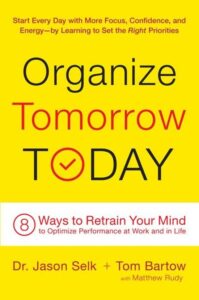Our latest Coaching books article says that you don’t have to get everything done.
‘Organise Tomorrow Today’ by Jason Selk, Tom Bartow and Matthew Rudy
The average lifespan is absurdly brief. If you live to be eighty, it is just over 4,000 weeks. So what do you do with this short space of time? Oliver Burkeman rejects the modern fixation on “getting everything done” in days filled with to-do lists, overfilled inboxes and the battle against distraction. And techniques on how to become ‘more productive’ and ‘life hacks’ often make things worse.
Instead, drawing on the knowledge of ancient and contemporary philosophers, psychologists and spiritual teachers, Burkeman delivers an entertaining, practical and finally profound guide to time and time management success. Four Thousand Weeks gives tips on how to construct a meaningful life by embracing what Heidegger called the ‘finitude’ of time, instead of futile attempts to increase what is available.
Burkeman himself started life thinking you could optimise personal productivity. He loved planning, to-do lists and highlighter pens. But as he got older he realised that it was impossible to feel in control all of the time. And, especially as kids arrived, he saw that time will almost never be your own to ‘spend’ efficiently.
The [UK newspaper] Guardian’s ‘pursuit of happiness’ correspondent for a decade also explains that time anxiety stems from the Industrial Revolution. This was when finite time coincided with clocking on and clocking off in factories – making time more pressured and precious.
Instead of lame encouragements to ‘find focus’, Burkeman advises to stop digital distraction as much as possible. Social media companies “making you care about things you don’t want to care about”. He also says Fomo – fear of missing out – is only debilitating if you fail to realise “that missing out is basically guaranteed” in life. And while self-help gurus may tell us never “to settle” in a job or relationship, Burkeman says sometimes “you don’t have a choice”.
 For Burkeman, productivity too is a dubious modern virtue. “The Latin word for business, negotium, translates as not-leisure, reflecting that work was a deviation from the higher calling [of ease].” Do not make leisure “just another arena for self-improvement,” he says. Instead embrace the book’s heros like the hobbyist who steals an afternoon for no purpose or a person who “develops a taste for having problems” knowing that “having no problems” only arrives after death.
For Burkeman, productivity too is a dubious modern virtue. “The Latin word for business, negotium, translates as not-leisure, reflecting that work was a deviation from the higher calling [of ease].” Do not make leisure “just another arena for self-improvement,” he says. Instead embrace the book’s heros like the hobbyist who steals an afternoon for no purpose or a person who “develops a taste for having problems” knowing that “having no problems” only arrives after death.
Definitely not your average self-help tome, and enjoying worldwide success, this provocative and appealing book, in the words of the Wall Street Journal’s Barbara Spindel, is “well worth your extremely limited time”.
Billed by one reviewer as “the best, most practical time management or organisation book I have ever encountered,” Organise Tomorrow Today says in spades that “doing more” is not the answer to time management. Highly successful people never get everything finished in any given day. But they always get the most important things completed.
With their sports background, the authors say athletes and business people alike do not try and do everything all the time. Indeed, that leads to doing nothing. The way to success is to focus on a few – and primarily just one – important item to accomplish each day.
Selk, Bartow and Rudy advise focusing on one concept and mastering it for at least three months before moving on to the next. Organise Tomorrow Today urges you to pick three very important, including one ‘must do’, activity that needs achieving before anything else. Excellence is not found in accomplishing the most items, it comes with achieving the most important ones – it’s quality before quantity.
If you organise yourself in this way, you will get the most difficult and meaningful task done before distractions set in and willpower dwindles, the book advises. Timing of this organisation process should take about five minutes. But do not wait until 4.55pm to do it, as that is bound to fail.
The ‘organise tomorrow today’ mantra is the crux of this absorbing time management guide, which is claimed to show you performance gains athletes, executives and salespeople spend tens of thousands of dollars to achieve. In addition, the authors offer “eight ways to retrain your mind to optimise performance at work and in life”.
The other seven practical tools are: choose wisely; maximise your time; win your fight-throughs; evaluate correctly; learn how to talk to yourself; learn how to talk to others; and, intriguingly, ‘be abnormal’ which must be roughly translated as ‘dare to be different’.
The book also advises a two-minute mental training drill that will start your day “with focus, confidence, and energy”.
About the authors
Dr Jason Selk helps well-known professional and Olympic athletes and Fortune 500 executives achieve elite-level results. Tom Bartow, following a career as a successful basketball coach, became one of the country’s top financial advisors and is now one of the premier business coaches in the US.







